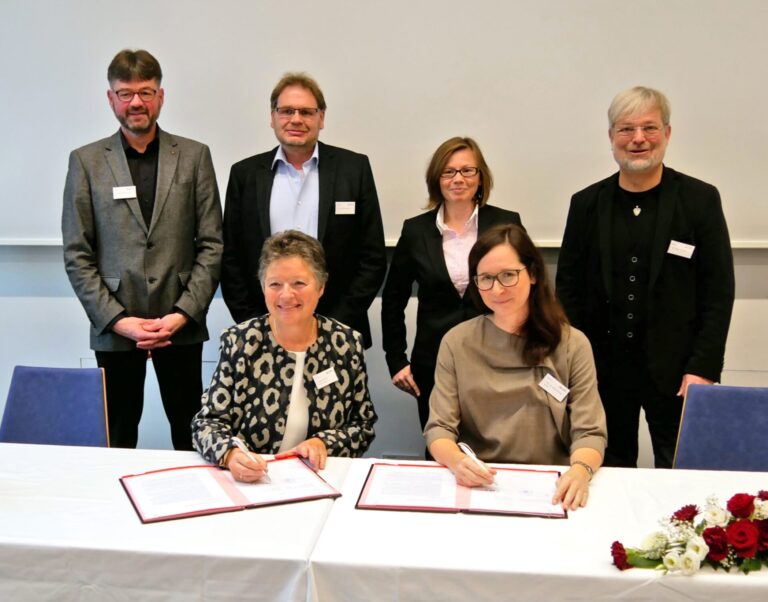Scientific partners of the Kaiserpfalz Research Centre
The Kaiserpfalz Research Centre is involved in the academic discourse through various collaborations. The cooperation with the General Directorate for Cultural Heritage (GDKE) arose from the desire of the Rhineland-Palatinate state authority to work together with the research centre as a specialist institution for medieval research. Within this framework, the experts at the Kaiserpfalz Research Centre prepare exposés on medieval state properties and also support the GDKE’s Directorate of Castles, Palaces and Antiquities (GDKE/BSA). One example of this successful cooperation are the excavations at the Worms cathedral , which the Research Centre has been supporting for several years with specialist archaeological expertise. Other projects include the castles of Pfalzgrafenstein and Trifels, whose museum presentations was redesigned by the research centre on the occasion of the state exhibition The Emperors and the Pillars of Their Power in 2020.
An important partner in the academic network is the Max Planck Institute for Legal History and Legal Theory in Frankfurt am Main (mpilhlt). In recent years, this collaboration has resulted in exhibition projects, international specialist colloquia and book projects.
The research centre also has a long-standing cooperation with the Volcanology, Archaeology and History of Technology (VAT) department of the Leibniz Centre for Archaeology in Mainz (LEIZA, formerly the Roman-Germanic Central Museum, RGZM). The focus here is on medieval material culture and economic history. In November 2018, the research centre and LEIZA signed a cooperation agreement in Ingelheim, and since then the collaboration between the two institutions has been expanded.
The Aachen – Ingelheim Palatine Research Working Group (Arbeitskreis Pfalzenforschung Aachen – Ingelheim) was founded back in 2009. Since then, annual conferences have been held on an ongoing basis, enabling a continuous exchange of expertise.

(hinten v. l.): Holger Grewe, Leiter der Forschungsstelle Kaiserpfalz; Dr. Lutz Grunwald, LEIZA;
Matylda Gierszewska-Noszczyńska, Forschungsstelle Kaiserpfalz; Dr. Holger Schaaf, LEIZA; (vorne v. l.); Irene Hilgert, Beigeordnete der Stadt Ingelheim; Prof. Dr. Alexandra W. Busch, Generaldirektorin des LEIZA. Bild: Stadt Ingelheim, Benjamin May.
Research cooperation with the Max Planck Institute for Legal History and Legal Theory
The research cooperation with the Max Planck Institute for Legal History and Legal Theory in Frankfurt am Main is coordinated by Prof Dr Caspar Ehlers at the mpilhlt. It originally emerged from the workshops of the Max Planck Institute for History in Göttingen in the research area German Royal Palaces, which has been based at the Max Planck Institute for European Legal History since 2007, from which the MPI for Legal History and Legal Theory emerged in 2022.
Significant milestones in the collaboration were the founding of the Aachen – Ingelheim Palatinate Research Working Group with the City of Aachen and RWTH Aachen University in 2009, the conception of an exhibition with an accompanying book on the 1200th anniversary of Charlemagne’s death in Ingelheim am Rhein in 2014 and the multidisciplinary symposium “Legal Spaces – Historical and Archaeological Approaches” in Frankfurt am Main in 2015.
More recently, the concept for the exhibition “The Charismatic Place – Stations of Travelling Kings in the Middle Ages” (Ingelheim 2019) with accompanying publication and, in 2020, the anthology of essays “Medieval Palaces and the Emperors’ Travel Routes” with current research reports on seven palaces and imperial castles of the 9th – 14th centuries in the Rhine-Main region were created. Most recently, the first instalment of an edition of written sources on the Pfalz Ingelheim, which aims to be complete, was published in 2023.
At the Max Planck Institute for Legal History and Legal Theory, the cooperation is based in the Department of Historical Normative Regimes in the research project Legal History and Archaeology. The ongoing central project “Landscape in the Laboratory” brings together a series of elaborate individual studies on medieval places of power within the Rhine-Neckar and Frankfurt/Rhine-Main metropolitan regions, which are being analysed in a multidisciplinary manner with regard to the construction of spaces.
Jurisdictions
Historical and archaeological approaches
(Studies in European Legal History 323)
Caspar Ehlers, Holger Grewe (eds.) Paperback, 336 pages with numerous colour illustrations.
€79,00
ISBN 978-3-465-04412-3
Further Co-operation partners

Centre Charlemagne
Neues Stadtmuseum Aachen
Projekt: Tagung Frühmittelalterliche Herrschersitze und der Norden – Machtzentren zwischen Diplomatie, Wissenstransfer und Wirtschaft im November 2022

Historisches Institut
RWTH Aachen
Projekt: Tagung Frühmittelalterliche Herrschersitze und der Norden – Machtzentren zwischen Diplomatie, Wissenstransfer und Wirtschaft im November 2022

Archäologisches Spessartprojekt

Fachgebiet Klassische Archäologie
Technische Universität Darmstadt
Projekt: Erforschung der Ortsbefestigungen von Ober-Ingelheim und Großwinternheim; Virtuelle Ausstellung ortsbefestigung3punkt0

Institut für Vor- und Frühgeschichtliche Archäologie
JGU Mainz
Projekte: Zusammenarbeit bei geophysikalischen Prospektionen (u. a. Georgskapelle Heidesheim, 2020) und archäologischen Ausgrabungen (u. a. 2017-2020 “Am gebrannten Hof”, Ingelheim)

Zentrum für Baltische und Skandinavische Archäologie
Projekt: Tagung Frühmittelalterliche Herrschersitze und der Norden – Machtzentren zwischen Diplomatie, Wissenstransfer und Wirtschaft im November 2022

